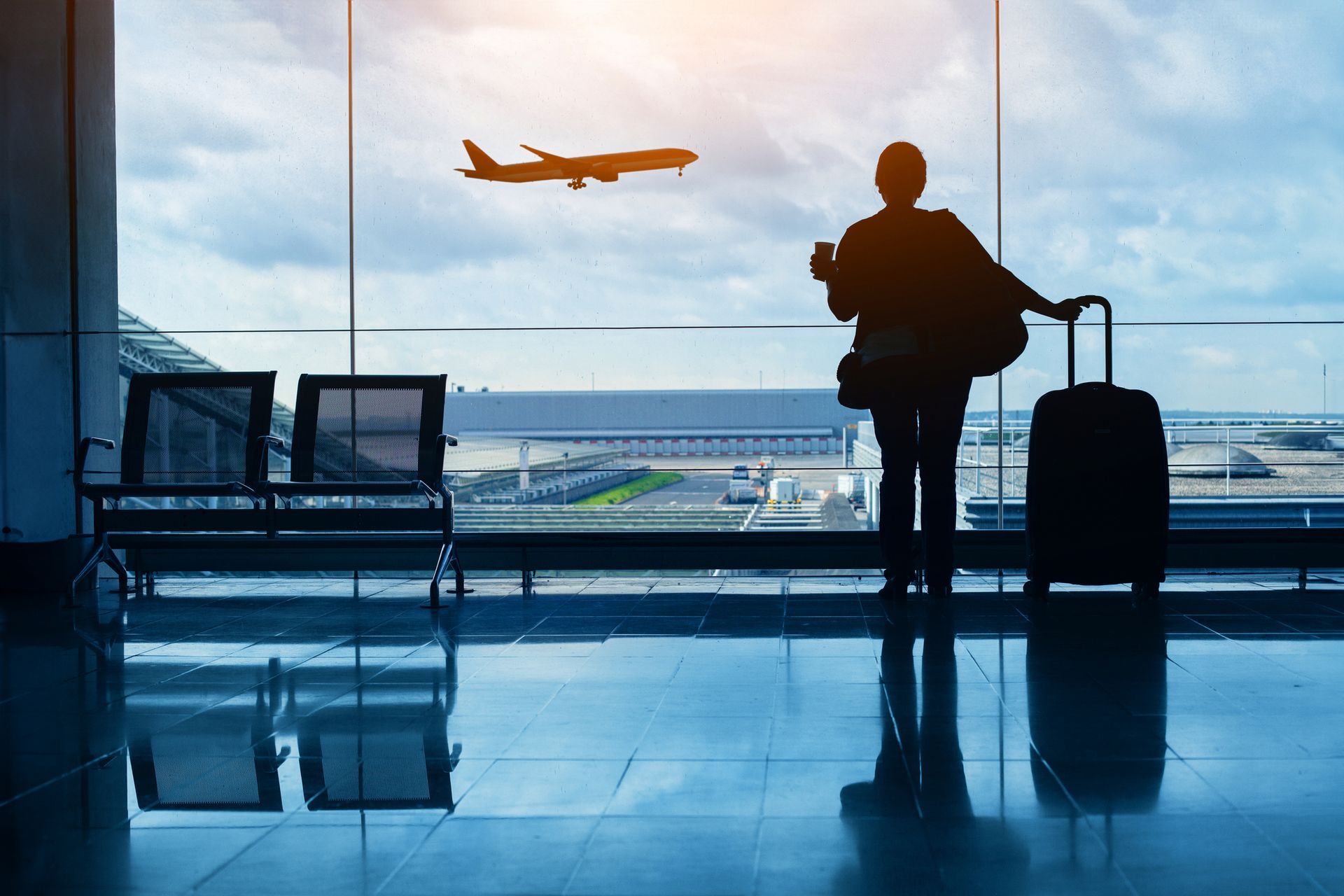Blog
Read Our Vacation Articles

October 13, 2024
In today's fast-paced world, we often think of travel as a luxury—a getaway from the demands of everyday life. However, new research suggests that travel may play a much larger role in our well-being than we realize, particularly for women in their prime years. According to a recent study conducted by University College London’s Centre for Transport Studies, there is a clear link between travel and health, with those who can explore beyond their local area reporting better health outcomes. The study, published in the Journal of Transport & Health, surveyed residents in the United Kingdom, with a particular focus on the North of England, an area known for its poorer health outcomes and limited access to transportation. Researchers found that individuals who face constraints on their ability to travel—whether due to a lack of transportation options or other barriers—tend to report poorer self-perceived health. In contrast, those who can travel freely and frequently outside of their home environment report feeling healthier overall. One possible explanation for this finding is the social connection that travel provides. When we travel, even if just to visit family or friends in nearby towns, we engage in social interactions that help combat loneliness and improve mental health. For many women, especially those in their prime, the opportunity to travel can enhance their sense of independence, provide moments of joy, and create lasting memories. Conversely, when travel becomes difficult or inaccessible, people may feel isolated, which could contribute to feelings of loneliness and a decline in both mental and physical health. The implications of this study go beyond personal health, highlighting the importance of accessible transportation systems, especially in regions with fewer travel options. As the researchers noted, the North of England suffers from limited transportation services, particularly outside large urban areas, which can lead to further social and health disparities. In a broader sense, this research emphasizes how vital it is for women in their prime to make travel a priority—not only for the joy and enrichment it brings but also for its tangible health benefits. Whether it’s a weekend getaway or simply a trip to see loved ones, travel allows us to maintain connections and stay engaged with the world around us. For those who may find travel difficult, seeking out social connections closer to home or finding ways to maintain a sense of adventure locally can still offer mental and emotional benefits. As women in their prime, travel can provide us with much-needed breaks, new experiences, and an overall sense of well-being. So, the next time you feel the urge to explore, remember—your health might just thank you for it. Sources: University College London’s Centre for Transport Studies study, Journal of Transport & Health Transport for the North, U.K. Travel can significantly boost both mental and physical health in a variety of ways. Here are some key reasons why travel is good for your well-being: 1. Reduces Stress and Promotes Relaxation Traveling often provides a break from daily routines and responsibilities, offering a chance to unwind and de-stress. By stepping away from the pressures of work and home life, travel allows the body and mind to relax, which can lower stress hormones like cortisol. Reduced stress is linked to better overall health, including a lower risk of heart disease and improved immune function. 2. Increases Physical Activity Many types of travel, especially those involving sightseeing or outdoor adventures, encourage physical activity. Whether it's walking around a new city, hiking, swimming, or exploring new landscapes, travel naturally promotes movement. Regular physical activity improves cardiovascular health, boosts energy, and can help with weight management. 3. Boosts Mental Health and Combats Loneliness Exploring new places often involves interacting with new people, whether through casual conversations, group activities, or guided tours. Social interactions during travel can combat feelings of loneliness, which are linked to depression and anxiety. Meeting new people and experiencing different cultures can broaden perspectives and create a sense of belonging, which is important for mental well-being. 4. Improves Cognitive Function Travel stimulates the brain by exposing it to new experiences, environments, and challenges. Navigating unfamiliar places, learning about different cultures, and adapting to new surroundings help keep the brain sharp. Studies suggest that this mental stimulation can improve cognitive flexibility and problem-solving skills, which can reduce the risk of cognitive decline and conditions like dementia as we age. 5. Enhances Creativity New experiences and environments inspire creativity by exposing travelers to different ways of thinking and living. This change in perspective often leads to more creative problem-solving and fresh ideas. For people in creative fields or anyone looking for a spark of inspiration, travel can be a powerful tool to refresh the mind. 6. Boosts Emotional Well-Being Exploring new destinations and engaging in travel adventures create positive emotions like excitement, wonder, and happiness. These feelings can increase overall emotional well-being and reduce symptoms of anxiety and depression. Travel also provides opportunities for self-discovery and personal growth, which can lead to greater life satisfaction. 7. Encourages Exposure to Nature Many travel destinations offer opportunities to be in nature, whether it’s visiting national parks, beaches, mountains, or rural landscapes. Time spent in nature is known to reduce stress, lower blood pressure, and improve mood. Studies show that spending time outdoors can increase levels of serotonin, a neurotransmitter associated with feelings of happiness. 8. Provides a Sense of Accomplishment and Confidence Travel, especially to new or challenging destinations, can boost confidence and provide a sense of achievement. Overcoming the challenges of navigating a foreign country or stepping outside one’s comfort zone can lead to a feeling of accomplishment, which can have lasting positive effects on self-esteem. 9. Strengthens Relationships Whether traveling with a partner, friends, or family, shared travel experiences can strengthen bonds and deepen relationships. These shared moments often bring people closer together, creating memories that enhance emotional connections and improve social support systems, which are key to long-term mental health. In conclusion, travel isn't just about exploring new places—it plays an essential role in maintaining and improving mental, emotional, and physical health. By offering a combination of relaxation, physical activity, social engagement, and personal growth, travel becomes an important tool for overall well-being.

October 1, 2024
The European Travel Information and Authorization System (ETIAS) will be required for visa-exempt travelers visiting Europe starting in early 2025 . It's important to understand the details regarding the expiration and validity of ETIAS to avoid any travel disruptions. Here are the key details about ETIAS expiration: Validity Period ETIAS is valid for up to three years or until the passport linked to the ETIAS expires— whichever comes first . If your passport expires before the three-year period is over, you will need to apply for a new ETIAS with your new passport. ETIAS and Passport Link ETIAS is electronically linked to the passport used during the application process. This means if your passport expires, becomes invalid, or you get a new one, your ETIAS will no longer be valid, even if the three-year period hasn't expired. Short-Term Stay Rule An approved ETIAS allows you to stay in the Schengen Area for up to 90 days within any 180-day period . The authorization can be used for multiple entries, as long as you don’t exceed the 90-day limit within the 180-day timeframe. Frequent Travelers Frequent travelers should be aware that while ETIAS is valid for multiple entries, it does not allow for long-term stays. If you frequently travel to Europe, ensure you track your days spent within the Schengen Area to avoid overstaying, as the 90/180 rule applies to all visitors. When to Reapply You will need to reapply for a new ETIAS in the following cases: Your passport expires . The three-year validity of your ETIAS has ended . You change nationality or receive a new passport with different details. You no longer meet the eligibility criteria (e.g., a criminal conviction or updated travel restrictions). Summary of Key Points ETIAS is valid for three years or until your passport expires , whichever comes first. It allows multiple entries for short stays (up to 90 days within any 180-day period). You need to reapply for ETIAS if your passport expires or your authorization period ends. By staying mindful of your ETIAS and passport expiration dates, you can ensure smooth, uninterrupted travel to Europe. Plan Ahead To ensure a smooth travel experience to Europe: Apply for ETIAS well in advance of your trip, ideally before booking flights and accommodations. Verify your passport and travel authorization details are correct and up-to-date. Stay informed about Europe’s evolving travel policies by visiting the official European Union website .

October 1, 2024
Planning a trip to Mexico? We want to keep you informed about some recent changes to Mexico's customs regulations that could affect your travel experience. To avoid unexpected delays or fees at the border, it’s essential to understand these updates. Key Changes to Customs Regulations: One Laptop or Similar Device Allowed Duty-Free: Each traveler is permitted to bring ONE portable computing device, such as a laptop, notebook, or iPad, without incurring any customs fees. Multiple Devices May Incur Fees: If you travel with more than one electronic device, like a laptop and an iPad, the additional items will be subject to potential customs charges. Quick Reference Guide for Allowed Items: One laptop or similar device (e.g., iPad, Android tablet) Up to 3 cell phones One GPS device Two cameras One pair of binoculars Four fishing poles Potential Fees: Exceeding the Limits: If you bring more electronic devices than the allowed limit, customs duties may apply. These fees can start at 19% of the item’s estimated value, with some travelers reporting fees as high as 200%. Keep in mind that enforcement is often random and can change without notice. Helpful Tips and Strategies: Pack Light: Avoid bringing unnecessary electronics to limit your risk of incurring fees. Declare All Items: Honesty is the best policy. Be upfront with customs officials about the electronics you’re carrying. Carry Proof of Purchase: Keep receipts or documentation for your electronics, as they can help in case fees are assessed. Check with Mexican Customs: For the most current information, contact Mexican customs or visit their official website. Other Important Considerations: Some regions, like Quintana Roo (where Cancun is located), require tourists to pay a visitor tax. To expedite your arrival, consider paying this tax online before your trip. Important Local Laws Travelers Should Know: Drugs & Alcohol: Possession, sale, or use of illegal drugs in Mexico carries severe penalties. Driving under the influence is also strictly prohibited and can lead to serious consequences. Weapons & Firearms: The importation and possession of firearms or weapons are tightly regulated. You must declare these items and obtain the appropriate permits to avoid legal trouble. Customs: Be cautious when bringing in prohibited items like fruits, plants, or animal products. Failure to declare these could result in fines or penalties. Transportation: Always use licensed taxis with meters or fixed fares to ensure your safety. Avoid unlicensed or informal transportation options. Cultural Sensitivity: Respect Mexico's cultural heritage. Adhere to local customs, dress codes, and traditions, especially in religious settings. Always ask permission before taking photos of people or sacred places. Disclaimer: Please be aware that customs regulations and local laws are subject to change. We strongly recommend verifying travel information with official sources before your trip. Navigating customs can be tricky, but we’re here to help! If you have any questions or concerns about these changes or your upcoming travel plans, feel free to each out to us. Safe travels! Useful Links: US.gov Learn About Your Destination MEXICO Enroll in the Smart Traveler Enrollment Program (STEP) to receive Alerts and make it easier to locate you in an emergency.

October 1, 2024
Traveling to Europe is set to change with the introduction of two new systems aimed at enhancing border security across the continent. The Entry/Exit System (EES) and the European Travel Information and Authorization System (ETIAS) are designed to streamline and strengthen the entry processes for both visa-free and visa-required travelers. Here’s what you need to know. What’s the Difference Between EES and ETIAS? While both systems aim to improve European security, they serve different purposes: EES (Entry/Exit System): This biometric system, launching on November 10, 2024, will register visa-free and visa-required travelers entering and exiting Europe for short stays. Registration is automatic at border crossings and replaces the traditional passport stamping. It applies to all non-EU travelers visiting for up to 90 days in a 180-day period. ETIAS (European Travel Information and Authorization System): Set to be implemented in early 2025, ETIAS will require travelers from visa-exempt countries to obtain travel authorization before entering Europe. Unlike a visa, this authorization will be valid for up to three years or until the traveler’s passport expires, whichever comes first. Entry/Exit System (EES) Overview The EES will use biometric data—such as digital photographs and fingerprints—to register travelers from non-EU countries. It aims to automate and expedite the border control process for both visa-required and visa-exempt travelers. Who Does EES Apply To? Non-EU nationals traveling for short stays (up to 90 days within 180 days). Travelers entering the external borders of any of the 29 European countries using the system. How It Works Upon arriving at the border: First-time travelers will have their personal data collected, including digital photographs and fingerprints. Returning travelers will only have their biometric data verified, speeding up the process. Manual passport stamping will no longer be used in countries participating in EES. However, Cyprus and Ireland will continue to stamp passports manually, as they do not participate in EES. ETIAS (European Travel Information and Authorization System) Overview Launching in early 2025, ETIAS will be a mandatory travel authorization for travelers from visa-exempt countries visiting Europe for short stays (up to 90 days). ETIAS is intended to bolster security by screening travelers before they arrive in the region. How to Apply for ETIAS The application can be completed online or via the official ETIAS mobile app. The process involves filling out personal details and paying a small fee of EUR 7 (some exemptions apply). Once approved, the ETIAS travel authorization will be linked to the traveler’s passport and remain valid for up to three years or until the passport expires. Key Points for Travelers Entry/Exit System (EES): Launches November 10, 2024. Biometric system (fingerprints and photographs) used for border control. Applies to visa-required and visa-exempt travelers for short stays. ETIAS: Launches early 2025. Mandatory for visa-exempt travelers. Requires travelers to obtain travel authorization online or via mobile. Authorization linked to passport; valid for up to three years. Plan Ahead To ensure a smooth travel experience to Europe: Apply for ETIAS well in advance of your trip, ideally before booking flights and accommodations. Verify your passport and travel authorization details are correct and up-to-date. Stay informed about Europe’s evolving travel policies by visiting the official European Union website . With these new systems, Europe aims to create a safer, more efficient travel experience for both visitors and residents alike. Make sure to prepare in advance and enjoy your travels across this diverse and beautiful continent!

October 1, 2024
Planning a trip to Barbados? Here are some important things you need to know to ensure a smooth arrival and enjoyable stay on this beautiful island. Complete the Immigration and Customs Form Travelers are required to complete the online Immigration and Customs Form , which will be available 72 hours prior to your arrival in Barbados. Here’s what you need to do: Fill Out the Form: Complete the form at a time and place convenient for you. Save Your Receipts: Once completed, save the Immigration and Customs receipts to your mobile device or print them out. Present Upon Arrival: Have the receipts ready to show at Immigration and Customs when you arrive. Important Travel Documents When traveling to Barbados, ensure you have the following documents: Valid Passport: Your passport must be valid for the duration of your trip. Return Ticket: A return ticket to your country of residence is required. Intended Address: Be prepared to provide the address where you’ll be staying. Evidence of Personal Support: Bring any documentation that demonstrates you can support yourself during your stay. Traveling with Minors If you’re traveling with children under 18, there are specific requirements: Unaccompanied Minors Must have a written consent letter from a parent or legal guardian. The guardian must provide official proof of guardianship , signed by a notary public with the seal affixed. The letter must: Indicate the duration of stay. Identify an authorized adult who will receive the child upon arrival, including their contact details. Minors Accompanied by an Adult Other Than a Parent/Legal Guardian Must carry a letter of consent from a parent, signed by a notary public with the seal affixed. The letter must: Indicate the duration of stay. Identify the accompanying adult, including their address and phone number. Identify an authorized adult who will receive the child upon arrival (if different from the accompanying adult), along with their contact information. Conclusion With the right preparation, your trip to Barbados can be a delightful experience. Make sure to complete the necessary forms and gather all required documentation well ahead of your travel date. If you have any questions or need assistance with your travel plans, feel free to reach out to us. Safe travels, and enjoy your time in paradise! Useful Links: Online ED Form for Barbados Learn Travel.gov - Learn About Your Destination BARBADOS Barbados Immigration Department Enroll in the Smart Traveler Enrollment Program (STEP)

October 1, 2024
As of July 1st, 2024, visitors traveling to Aruba by air will notice a new $20 Sustainability Fee add ed to their travel plans. This initiative aims to support various projects focused on enhancing sustainability efforts across the island, ensuring Aruba remains a beautiful and eco-friendly destination for generations to come. Quick Guide: Start Here All visitors (including children) spending more than 24 hours in Aruba are required to complete the online ED Card immigration form to be permitted entry. Read through all 3 steps to find out: Step 1: Answer Travel and Health Questions Travelers are no longer required to present a COVID-19 negative test result or proof of vaccination. Step 2: Consent to Aruba Government Mandates Visitors must consent to comply with the rules and procedures mandated by the Aruba n government, which includes: Acknowledgment and consent to cooperate with any COVID-19 testing as indicated by public health authorities, including potential isolation and/or quarantine. Consent to follow all instructions imposed by public health authorities, including isolation or quarantine due to exposure to COVID-19. For details on procedures for guests showing symptoms or a positive COVID-19 test result while in Aruba , please refer to our Your Health page. Timing: Consent to Aruba government mandates must be completed as part of the ED Card immigration form. Step 3: Arrival Health Procedures in Aruba All visitors will be required to comply with arrival health procedures as mandated by the Aruba Airport Authority and the Government of Aruba . Before you travel, download the Aruba Health App from the Aruba Department of Public Health. This mobile resource provides information on COVID-19 health procedures in Aruba and offers faster results for Molecular PCR COVID-19 tests taken on the island. Email Notification Upon successful completion of the ED Card process, travelers will receive an email confirmation of approval for travel (indicated by a green checkmark). This confirmation must be shown either digitally or in printed form at check-in or upon boarding. Note: You will need a valid passport and a working email add ress. Essential Travel Tips for Aruba Airline Updates & Requirements Before you travel, it's crucial to check for any updates from your airline. Download your airline’s app for real-time notifications on boarding passes and gate changes, ensuring a smooth travel experience. Completing the ED Card The Aruba ED Card is mandatory for all travelers, including infants. This document needs to be completed within 7 days prior to your arrival in Aruba . While you can fill it out independently, some services may charge a fee to assist you. Be sure to complete it in advance to avoid any last-minute issues. What to Bring Pack wisely for your trip! Ensure you have essential travel documents, prescription medications, and sun protection. If you're on specific medication, bring extra supplies, as local pharmacies may not carry your exact prescriptions. For more packing tips, check our resources. Avoid Long Lines with Global Entry U.S. travelers can enroll in Global Entry to expedite the customs process and avoid lengthy lines. Be sure to start your application well ahead of your trip, as it involves background checks and an in-person interview. Consider VIP Arrival Service Want to maximize your vacation time? The VIP Concierge Service can fast-track you through the arrival process and arrange airport transportation, allowing you to dive into your Aruba adventure right away! Traveling with Pets If you're bringing pets, be aware of the import requirements for dogs and cats from the USA. Check out our detailed guide for everything you need to know. Have Questions? If you have any unanswered questions, use the FAQ section at the bottom of the page to search for more information. Conclusion Aruba's commitment to sustainability is evident with the introduction of the new fee. By contributing, you’ll be part of a collective effort to preserve the island’s natural beauty and cultural integrity. For any questions or further information about your upcoming trip, don’t hesitate to reach out . Safe travels, and we look forward to helping you plan an unforgettable Aruba getaway! Useful Links: Mandatory ED Card Application Learn Travel.gov - Learn About Your Destination ARUBA Enroll in the Smart Traveler Enrollment Program (STEP) Aruba.com VIP Arrival Service

October 1, 2024
Planning a trip to the Dominican Republic? Here's everything you need to know about entry requirements to make your travel seamless and stress-free. Passport & Entry Guidelines Most visitors do not require a visa to enter the Dominican Republic. This includes tourists from the United States, Canada, the UK, the European Union, Japan, and many other countries. However, you must have a passport valid for at least six months upon entry, along with proof of your travel itinerary and a valid address for your stay. You’ll also need to demonstrate sufficient financial resources for your stay. Special Temporary Measures (June 1 - November 30, 2024) Travelers from the EU, UK, Canada, USA, Brazil, Chile, Argentina, Colombia, and Ecuador are eligible to enter the Dominican Republic for tourism purposes with a passport that remains valid throughout their stay, even if it is set to expire within this period. Diplomatic Exceptions Diplomats, officials from international organizations, and their families may enter the country without meeting the standard entry requirements, under conditions of reciprocity. Round-Trip Flight Requirement Since April 2023, airlines operating to and from the Dominican Republic are required to verify that foreign passengers possess a round-trip flight ticket. Dominican nationals and legal residents are exempt. E-Ticket Process All travelers—both foreign and Dominican—arriving by commercial flight must fill out an E-Ticket before departure. This can be done online as soon as you have your flight details, avoiding any last-minute delays at the airport. Extending Your Stay If your stay extends beyond 30 days, you will need to pay an additional fee before departing the Dominican Republic. The fee is based on the length of your extended stay. Visas If you're not from a visa-exempt country, you will need a visa to enter the Dominican Republic. Tourists can apply for single or multiple-entry visas, which require a passport valid for at least six months. Customs Duty Regulations for the Dominican Republic When entering the Dominican Republic, travelers are allowed to bring a certain quantity of goods into the country without paying customs duties. Below are the key details regarding customs allowances and duties: Duty-Free Allowances Tobacco Products: Up to 20 packs of cigarettes , or 25 cigars , or 200 grams of to bacco. 2. Alcoholic Beverages: Up to three liters in to tal of wine, beer, rum, whiskey, or other spirits. 3. Gifts: You can bring in gifts with a to tal value of up to USD 500 . This allowance can be used once every three months. 4. Medicines: Medicines for personal use are allowed in quantities that justify their exclusive use by the passenger. If the medicine contains psychotropic substances , you must present a prescription for its use. Additional Regulations Prohibited Items: Certain goods are restricted or prohibited from being imported, including illegal drugs, firearms (without proper authorization), and counterfeit goods. Items Subject to Duty: If you exceed the duty-free allowances or bring in items that are not covered by these categories, you may be required to pay customs duties. The rates will vary based on the type of goods and their declared value. Commercial quantities of goods may also be subject to duties and add itional import regulations. Declaring Items You must declare any goods that exceed the allowed duty-free limits upon entry into the Dominican Republic. Failure to declare items that exceed duty-free limits may result in fines, confiscation of goods, or other penalties. For more information on customs duties, prohibited items, and detailed guidelines, it is advisable to consult the Dominican Republic Customs Authority website or visit official customs offices upon arrival. Health Considerations: Yellow Fever Vaccine If you're arriving from Brazil or Venezuela, proof of vaccination against yellow fever is required. Travelers from Equatorial Guinea are temporarily barred from entering due to a Marburg virus outbreak. Useful Links E-Ticket Application Tourist Visa Requirements Stay informed and travel confidently with our guide to the Dominican Republic's entry requirements. For the most current updates, always check official resources before your trip.

September 30, 2024
Starting in early 2025 , the European Travel Information and Authorization System (ETIAS) will be a mandatory requirement for all travelers, including children, who come from visa-exempt countries and plan to visit Europe for short stays (up to 90 days within a 180-day period). Here’s a guide for parents to understand how ETIAS applies to children. Do Children Need ETIAS? Yes, all travelers from visa-exempt countries, including infants and minors , must have a valid ETIAS travel authorization to enter any of the 30 European countries that require it. There are no age exemptions for ETIAS, so children and babies must apply just like adults. How to Apply for ETIAS for Kids The application process for children is very similar to that for adults, but parents or legal guardians will need to complete the form on behalf of their children. Application Process for Children: Personal Information: Parents or legal guardians will fill out the child’s personal information, such as name, birth date, nationality, and passport details, on the official ETIAS website or mobile app. Linked to Passport: The child’s ETIAS travel authorization will be electronically linked to their passport. If the child receives a new passport before the ETIAS authorization expires, they will need a new ETIAS as well. Fee Exemption: While adults typically pay a fee of EUR 7 to apply for ETIAS, children under the age of 18 are exempt from this fee. However, they must still complete the application process and receive authorization. Approval Process: Like adult applications, most children’s ETIAS applications will be processed within minutes. In rare cases, additional documentation may be requested, which could delay approval for up to 30 days. Therefore, it is advised to apply for ETIAS well in advance of your trip. Traveling with Children to Europe Each child will need to carry their own passport and must have their ETIAS travel authorization linked to it. Even if they have an approved ETIAS, entry into Europe is not guaranteed; border guards may ask to see additional documents related to the child's stay, including proof of accommodation and return tickets. Key Points for Parents All children , regardless of age, need their own ETIAS to travel to Europe. No application fee for children under 18. Apply in advance to avoid delays, especially when traveling with minors. Ensure that passports are valid for at least three months beyond the intended departure date from Europe. By staying informed and ensuring your child has the necessary travel documents, including ETIAS, you can enjoy a smooth and stress-free trip to Europe.

August 27, 2024
As your trusted travel agency, we're here to ensure you're always prepared for your next adventure. Today, we're focusing on an important update you need to know about: the Real ID requirements in the United States. Starting May 7, 2025, you will need a Real ID-compliant driver's license or state ID to board a domestic flight. Let's dive into why this is crucial and what you must do to ensure your travels go smoothly. What is Real ID? The Real ID Act, passed by Congress in 2005, established minimum security standards for state-issued driver's licenses and identification cards. These enhanced IDs are part of a nationwide effort to improve the reliability and accuracy of state-issued identification documents, enhancing national security. Why You Need a Real ID Beginning May 7, 2025, travelers can no longer use a non-REAL ID-compliant driver's license or state ID to board a domestic flight. Therefore, if you want to fly within the United States, you'll need a Real ID-compliant license or one of the alternative forms of identification accepted by the Transportation Security Administration (TSA). How to Get Your Real ID Getting a Real ID is straightforward but requires some preparation. Here are the steps to ensure you get your Real ID without any hassle: 1. Check Your License: Look for a star marking in the upper portion of your driver's license or state ID. This star indicates that your ID is Real ID-compliant. If your ID lacks this marking, you need to upgrade. 2. Gather Required Documents: You must present several documents at your local Department of Motor Vehicles (DMV) to obtain a Real ID. These generally include: Proof of identity (such as a valid passport or birth certificate) Proof of Social Security Number (such as a Social Security card or a W-2 form) Two proofs of your current address (such as utility bills or a lease agreement) 3. Visit the DMV: Bring your documents to your local DMV office. Be prepared for a wait; many people will need to upgrade their IDs as the deadline approaches. 4. Apply Early: Don't wait until the last minute. The closer it gets to May 7, 2025, the busier the DMVs will become. Apply for your Real ID immediately to avoid long lines and processing delays. Alternative Forms of Identification If you do not upgrade your license or state ID to a Real ID, you can still fly domestically by using one of these other acceptable forms of identification: Valid U.S. passport or passport card DHS trusted traveler cards (Global Entry, NEXUS, SENTRI, FAST) U.S. military ID (active duty or retired military and their dependents) Permanent resident card Border crossing card Federally recognized, tribal-issued photo ID Ensuring that any alternative ID you plan to use is valid and meets TSA requirements is essential. Why It's Important Upgrading to a Real ID is more than just a regulatory change; it's about ensuring your travels are seamless and stress-free. Without a Real ID or another acceptable form of identification, you could face significant delays or even be unable to board your flight. By acting now, you can avoid these potential travel disruptions. Final Thoughts As your go-to travel agency, we're dedicated to informing and preparing you for your travels. Remember, the deadline for Real ID compliance is May 7, 2025. Don't wait—start the process today and ensure your future travels are smooth and worry-free. If you have any questions or need assistance with your travel plans, feel free to reach out to us. We're here to help! Safe travels and happy adventures!
Ready to book?


Content, including images, displayed on this website is protected by copyright laws. Downloading, republication, retransmission or reproduction of content on this website is strictly prohibited. Terms of Use
| Privacy Policy


